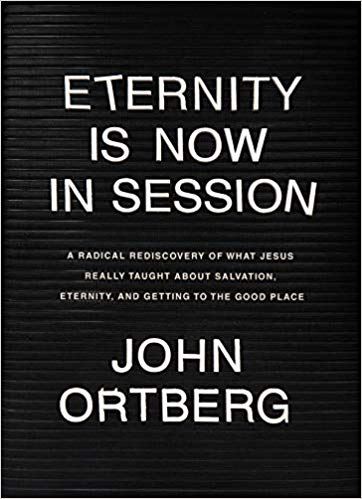Are we there yet? Every parent has heard it. Every kid has asked it. Every human being has felt it. We suffer from destination impatience. We rush through life, always in a hurry. To get to where, we do not know. The late cardiologist Meyer Friedman coined the phrase “hurry sickness” to describe this rushed, worried, preoccupied, time-poor quality of our lives after his upholsterer noted the unusual pattern of wear on the chairs in his waiting room. Apparently, they had only become worn out along the front edge. With nothing to do other than wait to meet with their cardiologist, people were literally sitting on the edge of their seats. Are we there yet? Something in us is waiting. For what, we do not know. Something different? Something better? Sometimes it feels like we’ve been waiting forever. In the Christian faith, the deepest and most mysterious expression of what we’re waiting for is found in the word eternity. God has “set eternity in the human heart,” we’re told in Ecclesiastes 3:11. We have a haunting sense that there is something more than this transient world. We alone of all creatures know that “all flesh is as grass.” But God has set eternity in the human heart. Are we there yet? Most of us think of eternity as an endless duration of time. And yet we hunger for more than just an infinite continuation of life as we now experience it, with all its sufferings and disappointments. In fact, the fear of unending existence carries its own label—apeirophobia—and can be as unsettling as the thought of death.[1] But in her book Images of Salvation in the New Testament, Brenda Colijn writes that the eternal life the Bible talks about is not primarily marked by its duration. Eternal life is “qualitatively different from mortal human life. It is ‘the life by which God Himself lives.’”[2] It is “primarily qualitative rather than quantitative.”[3] “‘Eternal’ describes the kind of life one has in Christ.”[4] Which means eternal life isn’t just about the future. We can have it now. It’s not just about there. We can have it here. Most important, it’s not something we simply receive through a transaction that arranges for our future destination. It’s something we experience now through becoming Jesus’ disciples, which death is then unable to stop. This means many of us will have to think differently about the Good News that Jesus brought. According to Boston University professor of religion Stephen Prothero, it is the notion of an “arrangement” for getting into eternal life someday that sets Christianity apart from other religions. In his book God Is Not One, Prothero defines Christianity as “the way of salvation.” He describes the usual Christian message: “Sinners cannot be admitted to heaven or granted eternal life”; therefore, “anyone who hears this story [the gospel], confesses her sins, and turns to Jesus for forgiveness, can be saved,” which results in “go[ing] to heaven.” He goes on to say, “Today the price of admission to the Christian family continues to be orthodoxy (right thought) rather than orthopraxy,” actually doing what Jesus said.[5] In other words, Christians are people who believe the right things and will therefore be allowed into heaven when they die. This view calls to mind the climax of the movie Monty Python and the Holy Grail, when King Arthur and his knights come to the castle they’ve been seeking. Lying between them and the castle is a bottomless abyss, and a wizened old bridge keeper guards the only bridge that allows access. If they can give the correct answer to his questions, they are allowed to cross. If not, they are cast into the abyss. I believe this is how many people today think about salvation. When we die, we are either headed for the castle (heaven) or the abyss (hell), and “salvation” is knowing the right answer so that God has to allow us to cross the bridge. The problem is, Jesus doesn’t talk about salvation that way. He doesn’t talk about eternal life that way either. In fact, Jesus—and the entire New Testament, for that matter—defines eternal life only once, with great precision, and in a way that has been largely lost in our day: “This is eternal life, that they may know you, the only true God, and Jesus Christ whom you have sent” (John 17:3, NRSV). Eternal Life = Knowing God. Notice that Jesus doesn’t say “that they may know about you.” He says “that they may know you.” Philosophers distinguish between knowledge by description and knowledge by acquaintance.[6] For example, I might be able to describe Moscow because I’ve read about it in books and seen it in movies, but I know by acquaintance what Rockford, Illinois feels like on a hot August night and what it smells like after a thunderstorm. I know the sound of a tennis ball bouncing on the courts of East High School. I know its hopes and divisions and fears, and I know Stockholm Inn Swedish Pancakes because Rockford was my home. Knowledge by acquaintance includes description but goes far deeper. It is interactive and participatory and experiential. The kind of “knowing God” that is eternal life is an interactive relationship where I experience God’s presence and favor and power in my real life on this earth. To know God is to live in a rich, moment-by-moment, gratitude-soaked, participatory life together. To know God means to know myself as his beloved friend as a gift of grace. To know God means to know what Paul called “the power of his resurrection” (Philippians 3:10) in the details and tasks and challenges of my daily, ordinary life. This is eternal life. It is not something far away in outer space that we can only hope to experience after we die. It is not simply being able to give the right answers at church, affirming the right doctrines, or achieving the minimum entrance requirements to cross over the bridge and get into heaven. On the contrary, it’s something much bigger and far more amazing. The gospel Jesus preached is the Good News that this eternal kind of life is available now. By grace. Through Jesus. Forever and beyond death. “Eternal life in the individual does not begin after death, but at the point where God touches the individual with redeeming grace and draws them into a life interactive with himself and his kingdom.”[7] I have a sign on the back wall of my office that I look at first thing every morning when I sit down at my desk. In large block letters, it echoes something my good friend Dallas Willard used to say: “Eternity Is Now in Session.” God is not waiting for eternity to begin. God lives in it right now. It is the interactive fellowship and joy that exists between Father, Son, and Holy Spirit. Eternity is rolling right along, and we are invited to be part of it—now. Certainly, as long as we’re in this world, we have much to wait for. Are we there yet? Of course not. Death still robs us of those we love, children still go hungry, refugees have no place to live. We lose our jobs or our dreams or our loved ones. Our bodies age and decay. Every day when I look at the mirror, I’m reminded I’m not there yet. Paul wrote that creation itself is groaning for the day when it will be “liberated from its bondage to decay” (Romans 8:21). Amazingly, even the Spirit of God groans for this (verse 26). To anyone who wonders, along with an old neurotic Jack Nicholson movie character, “What if this is as good as it gets?” Paul says that not only we but all creation will one day taste the freedom and glory of the children of God. “What would become of us,” asked John Calvin, “if we did not take our stand on hope?”[8] And yet, in another way, we are there. Or rather, there has come here. In the midst of our groaning, eternal life has slipped into our temporal world now through the carpenter of Nazareth. In the midst of disappointment and decay, the Sustainer comes alongside me. In the midst of loneliness, a Friend comes who will not let me go. In the midst of the valley of the shadow of death, I will fear no evil, for he is with me. Eternity has invaded time. “There”—life in God’s presence and power—has come here. No one yet knows how deeply humanity in this world can enter into the peace and love of eternity. You can make your life a Great Experiment in this adventure. Dallas once wrote, “We must . . . do nothing less than engage in a radical rethinking of the Christian conception of salvation.”[9] I think he’s right. Somewhere along the way, the power and the promise of the gospel has been lost. We’ve shrunk it down by making it solely about going to heaven when we die, and in doing so, we’ve shrunk God down too. We have often preached a gospel that does not naturally call for “knowing God,” a gospel that does not naturally call for disciples. But what if we stopped thinking about the gospel as simply the minimum entrance requirements to get into heaven? What if we stopped thinking about eternal life as something we can only experience after we die? What if we stopped thinking of Christians as people who know about God and instead focused on becoming disciples who are learning to know God? What if salvation isn’t mostly about getting us into heaven but about getting heaven into us? Much of the way we’re taught to view eternal life is as a destination we reach, and until we get there, we’re like anxious kids on a long car trip asking, “Are we there yet?” We think we’re just biding time until we get there, when the real enjoyment will begin. But what if we’re missing out along the way? This book contrasts two ways of thinking about Jesus’ gospel. The more common version is thought to involve how people ensure they will go to heaven when they die. It’s about how to go from “down here” to “up there.” It usually involves affirming certain beliefs or praying a particular prayer that is thought to make a person a “Christian.” The other understanding is that the gospel announces the availability of life under God’s reign and power now. It’s about “up there” coming “down here.” By grace. Through Jesus. Transcending death. To all who will. For the sake of the world. The first version tends to produce consumers of Jesus’ merit. The second tends to produce disciples of Jesus’ Way. I believe the latter version is the correct one, the one that Jesus taught, the one that “snapped history into B.C. and A.D. as if it were a dry twig.”[10] He is still recruiting people for this, the great journey of inner change and outer purpose. Maybe he’s recruiting you. Are we there yet? It’s time to “engage in a radical rethinking of the Christian conception of salvation.” Eternity is now in session. John Ortberg, Eternity Is Now in Session: A Radical Rediscovery of What Jesus Really Taught about Salvation, Eternity, and Getting to the Good Place (Carol Stream, IL: Tyndale Momentum, 2018). |
If you are wanting to do a particular passage or book study and can't find it, feel free to email me at josh@joshhunt.com21 Laws of Discipleship -- the book -- |



















